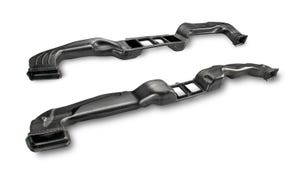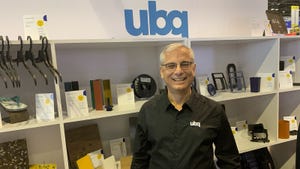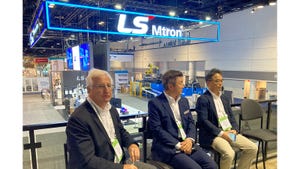A Global Automotive Supplier
April 1, 1997
MaP Operates a large moderninjection moulding, |
It has become very clear that those injection moulders who want to beTier One automotive parts makers in the next century have to pass somevery stringent tests: they have to be absolutely first class in terms oftechnology and consistent quality; they have to be global suppliers inthe truest sense of the word; and they have to offer enough R&D depthto be an active partner in the development of new parts.
Following the recommendation of Ford Motor, we found one such companyin the center of Portugal ? MaP?Materias Plasticas SA of Leiria? that already passes these tests and is poised for additional growthas a global supplier.
Moulding parts for automotive companies has become, particularly inrecent years, one of the more demanding areas in plastics. Car makers havecontinuously toughened quality requirements and moulders had to deliveror stop being suppliers. Car makers also exerted major efforts in winnowingthe list of suppliers to relatively few ? suppliers that can producequality product on a sustained basis and, if possible, do so on a globaland uniform basis. "To survive," said our host and director ofmarketing for Technical Products Nuno Queiroz Romero, "you need tohave a global position."
One result of this evolution is moulders that remain tend to be plantswhere you find a concentration of often very advanced technology combinedwith an almost extreme attention to quality control.
Background
MaP was first formed in 1946 and engaged in the injection mouldingof housewares and bathroom components. Many of these products were plated.Until 1975, the company was also engaged in numerous other processes includingfilm and PVC profile extrusion. The expertise of plating parts as wellas the precision moulding requirements of bathroom parts ? such asfaucets ? allowed MaP to go after other business opportunities withsimilar precision requirements.
This was the company's primary business until 1975. At that time, itstarted to concentrate only on injection moulding of a wide range of housewares,bathroom fixtures, automotive, and electronics parts. This was quite achange: in one year the company eliminated 90 percent of its product lineto concentrate just on one plastics production process.
In 1985, the company formed a Technical Products division that concentratedon automotive components, such as radio bezels, as well as technical productsfor customers such as IBM in France for whom MaP moulded structural foamparts. Other markets were housewares, furniture, various E/E parts, andindustrial products.
The moulding floor is arrangedin workcells, |
In 1991, the company started to design from the ground up a new injectionmoulding and finishing plant specifically designed for technical moulding.Inaugurated in 1993, this plant was designed with the specific qualitycontrol requirements of the automotive industry in mind, says Romero, whowas involved in that complex process.
In 1996, the company split the bathroom business from the TechnicalProducts business, realizing that these had become two entirely differentcompanies. Finally, in 1996, the company made a strategic move towardsbecoming truly global by entering into a partnership with Key PlasticsUSA of Novi, Michigan, USA. That resulted in the name change to MaP/Key.
Rapid Growth
What marks MaP/Key more than any other factor is that the company'stechnical products business ? most of which goes into cars ? hasgrown very rapidly with growth rates typically found only in such highgrowth markets as software and Internet technologies.
From 1994 to 1995 ? with sales above US$ 6 million ? salesmore than doubled to US$ 18 million. By the end of 1997, the company projectssales to again increase sharply to more than US$ 23 million.
Concentrating on a Few Customers
Key to the company's philosophy is that it can only remain a world?class supplier if it concentrates on relatively few customers. This, saysRomero, allows it to build long? term relations and provide the incrementalimprovements in quality so desired by automotive customers. Today MaP/Keyalready supplies customers globally, shipping product to Brazil, Spain,and France. Over 60 percent of its output ? which first goes to a Fordassembly plant in Portugal ? is ultimately exported from Portugal.While technically a custom moulder, MaP/Key more resembles one of the high?quality Japanese moulding plants that dedicates its entire production toone or two customers and, in a sense, becomes part of that customer's operation.MaP/Key's goal is to grow with Ford of Europe, its primary customer. TodayMaP/Key has five major customers. It aims to grow the business with eachone.
This seemingly narrow yet very positive approach to a moulding businessis also reflected in the limited number of products moulded, partiallyassembled, and painted in that plant. MaP/Key's Technical Products divisioncurrently produces radio bezels, instrument clusters, housings for electricalequipment, housings for telecommunication equipment, and cable ducts forwiring harness. Other parts are outside panels and screens for computers;front baffles and panels for loudspeakers; housings for electrical appliances? such as coffee machines, grills, or hair dryers; and components foroffice furniture.
A large and fully automatedwarehouse keeps |
Virtually all of these are parts for which appearance is critical; many,such as the automotive parts, must be matched to other components. Thecompany's 50 years of experience in moulding appearance parts, such asbathroom components, provides a rich knowledge base.
Automotive customers have made it perfectly clear in recent years thatone price of being a supplier is that suppliers will foot part of the billof designing and developing new parts. This requires MaP/Key to devoteconsiderable resources on basic part design and engineering. Some 18 plasticsand design engineers are devoted to this task.
The Plant
MaP/Key had the advantage of building a new plant from scratch justa few years ago. The plant was designed from the ground up to allow forflexible manufacturing and quick product changes. This is of particularimportance when serving customers increasingly demanding just? in?time delivery, says Romero. "We ship to Ford every day." Forfinished product, the company's clients maintain an inventory of just 1.5days.
MaP/Key operates 35 injection moulding machines ranging in size from40 tons to 900 tons clamping force. Machine suppliers include Netstal andEngel for the smaller machines and Krauss? Maffei for the larger units.In addition, the company operates two twin? shot injection mouldingmachines. Virtually all injection machines above 500 tons clamping forceare equipped with part? removal robots. Quick mould changers have beenstandard for several years.
The injection machines are arranged in production cells, all dedicatedat a given point in time to making one or two specific products and allrelated components. The company also has one cleanroom for clear opticalparts such as lenses for instrument clusters.
Materials, stored in a computerized warehouse, are brought to a centralfeeding and drying station and are vacuum? conveyed to the injectionmachines. MaP/Key uses engineering resins supplied mostly by GE Europe,BASF, and DSM.
Moulded parts are placed ontrays and then moved |
Quality Control Is Critical
For quality control, the company has a fully equipped laboratory. Partscan be subjected to dimensional quality control on two CMM computer controlledmachines, or on a profile projector, and can be tested with various electronicgauges.
The lab and the production control offices next door are right nextto the plant floor, visually connected through large open windows. Supervisingprocess engineers can access key statistics and other data at any timeand can monitor quality in "real time."
After painting, the bezels aredried and then |
MaP/Key has full statistical quality control on several key processparameters in real time. Additionally, all injection machines are tiedinto central MRPI and MRPII processes, allowing for remote computer andprocess control.
This devotion to quality control is of great importance for the company'sproduct line. All parts have to be moulded to very tight tolerances, oftento less than ±.05 mm. Maintaining recommended moulding temperatures,keeping the materials supply free of any debris, and reducing other suchfactors as static are paramount for MaP/Key: probably 90 percent of theoutput is appearance parts.
While the company uses every known tool in terms of electronics forquality control, each part also undergoes several visual inspections. Thisreporter counted six different visual inspection steps for the variouscomponents that make up a radio bezel. All over the plant, you find largeboards on which are mounted "perfect" parts as well as partswith a wide range of problems to assist workers in quickly spotting mistakes.
MaP/Key has impressive quality control ratings from its clients inaddition to operating at ISO 9002.
Many of the final componentsare assembled |
Secondary Operations and Finishing
After being moulded, the parts are conveyed to a secondary finishingarea. There, MaP/Key does lacquering, laser etching, robotic assemblies,and hot stamping. While much of these operations may appear routine, itis important to note that MaP/Key applies its expertise and developed manyof these fully automated finishing systems on its own.
For painting operations, MaP/Key offers three separate systems: anautomatic electrostatic paint line by high rotation bells and two boothsfor painting with conventional guns.
A fully automated paint linebuilt into MaP's |
Small parts ? in specially designed racks that accommodate severalhundred items ? move automatically through the paint station. Largeparts are hung on a conveyor belt and are moved through a painting linethat offers conventional automatic and semiautomatic spray painting.
The company has specialized technology for laser etching, used to markradio bezel parts with all types of graphic designs. For hot stamping,MaP/Key has machines up to 100 tons and can hot stamp parts as large as400 mm in width or length. Other finishing operations include silk screening,pad printing, ultrasonic welding, and heat staking.
Radio bezels and other subassemblies are assembled in a fully automaticconveyor system equipped with numerous robots. The system is flexible andcan be quickly changed to accommodate various part designs. Much of MaP/Key'sproprietary and patented technology is used for this complex assembly process.
Research and Development
A substantial portion of MaP/Key's annual budget is devoted to researchand development, aimed at developing improved production technologies.The company has a team of 18 engineers that also work on quality controland process monitoring. The company is closely involved in part design,using computer? aided part design, and works with various mouldmakingcompanies throughout the region.
At the core of the current R&D program is the development of newlaser etching technologies of painted and nonpainted components, technologiesfor two? coat painting, heat staking, technology for structural foamparts for office and computer components, and enhanced manufacturing monitoringsystems.
MaP/Key clearly benefits from Portugal's improving education system.According to Romero, the plant's 380 workers constitute an easily trainedand very stable workforce. MaP/Key devotes substantial resources on trainingand further education for its workers. Another benefit ? hard to matchanywhere else in the world ? is that the plant operates some 20 kmfrom what must be considered the world's largest concentration of mouldmakingcompanies. More than 200 mouldmakers operate in the nearby Marinha Grandearea.
MaP/Key's goal is to become even more global. This, says Romero, canultimately only be done through partnerships and multiple manufacturinglocations close to the final assembly plants. MaP/Key hopes to accomplishthis through the partnership with Key Plastics. Key Plastics, in a similarbusiness and with a similar philosophy as MaP/Key, recently purchased aminority share of MaP/Key. In April 1996, Key also acquired Clearplas Ltd.,an automotive moulder in Coventry, England. That company, again in a similarbusiness, now operates as Key UK.
In the United States, Key operates 10 moulding plants in Plymouth andGrand Rapids, Michigan; Felton and York, Pennsylvania; Hartford City, SouthBend, and Hamilton, Indiana; and Montpelier, Ohio. The company also hasa plant in Chihuahua, Mexico.
The "Green" Approach
Environmental protection is serious business for MaP/Key. Considerableresources are devoted to preventing pollution by fluid or gaseous by-productsof the painting or moulding operations. Equipment is selected not onlyfor production efficiency, but also for energy efficiency. All facilitiesare designed to maximize natural light. To minimize water usage, rain wateris used in fixed circuits for applications such as cooling or cleaning.
You May Also Like









